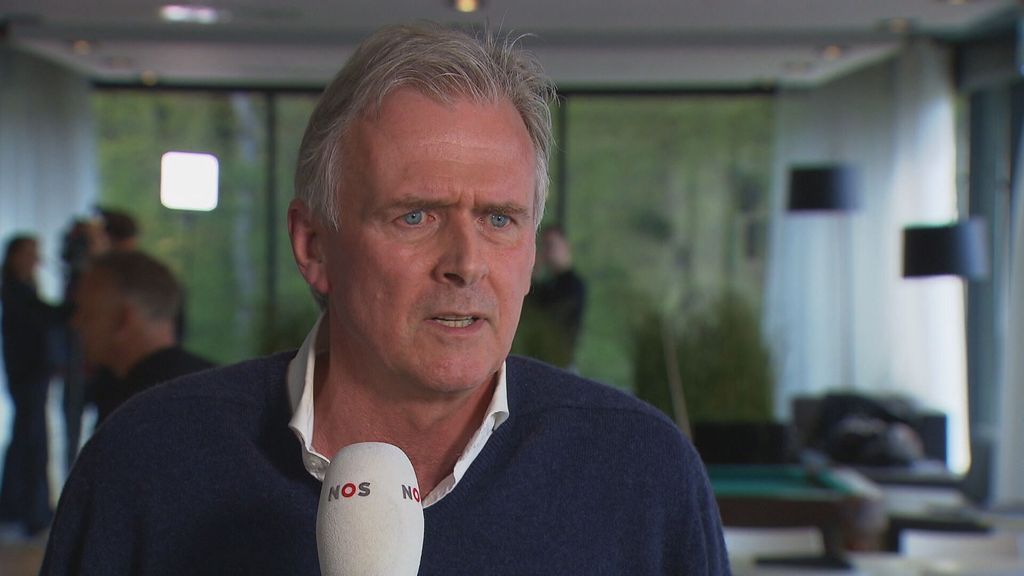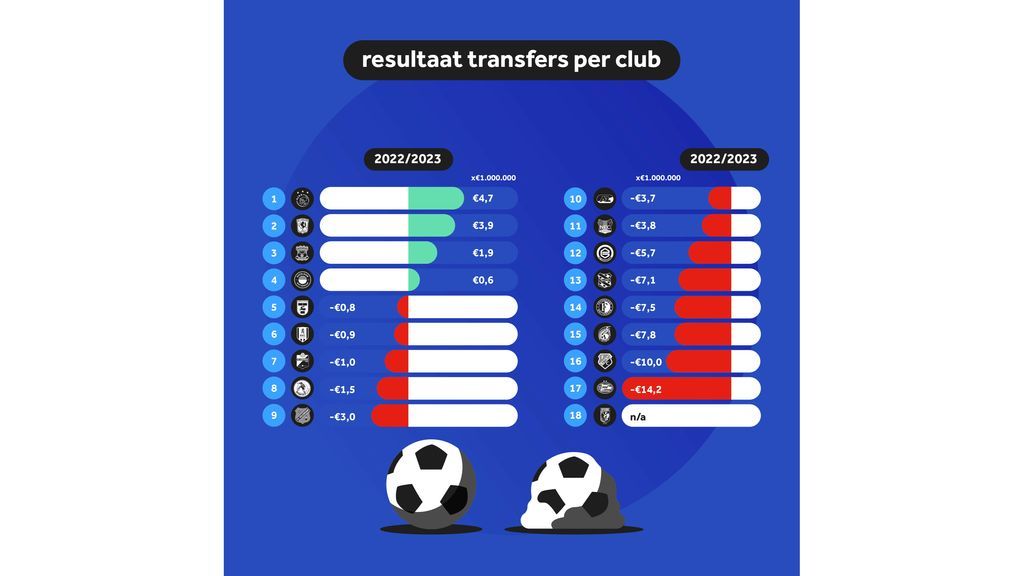NOS Football•today, 10:09
Financial problems are never far away at football clubs. This season alone it became clear that VVV-Venlo, MVV and of course Vitesse do not have their financial affairs in order. A look at the past decades reveals an even longer list of problem cases.
The learning capacity of many professional football organizations (BVOs) appears to be limited. Research based on the annual reports of the Premier League clubs from last year shows that several clubs are playing a risky financial game.
“There is a good chance that even more clubs will run into problems in the future,” says Job Gulikers, who, together with colleague Willem de Boer, has mapped out the financial situation of Premier League clubs on behalf of HAN University of Applied Sciences for the fourth year in a row.
The KNVB also notices that various clubs are having financial difficulties. The association says that this is partly the result of the corona pandemic, although each situation is individual.
Income is increasing, but so are expenses
“You see that the income of clubs, with the exception of the corona years, has been increasing for years, but that financial problems continue to plague the football world,” says Gulikers. He sees that most clubs structurally spend too much. “And corona should not be an excuse, because clubs have had sufficient time to adjust their policy and budget more conservatively.”
Tsjalle van der Burg, sports economist and affiliated with the University of Twente, sees the same thing. He can explain the spending patterns of football clubs. “As a director you are mainly judged on the ranking and not on financial performance.”
He explicitly mentions the pressure from supporters, who sometimes perform chants. “While the board is also in the stands.”
According to Van der Burg, this ensures that directors occasionally make decisions that will be liked by supporters. “Buying players, for example.”
The fact that directors are “sometimes vain” and therefore take the spotlight when it comes to sporting successes does not help, according to Van der Burg.
The university lecturer emphasizes that it is logical to take sporting performance as a starting point. After all, that is what a football club is all about. “TV funds have become increasingly important and are distributed based on the rankings.” Nevertheless, he hopes that financial discipline will become more important in the football world.
Gulikers says that there is no incentive to be frugal. “A phenomenon known in the financial world as ‘moral hazard’. History shows us that there is always a savior in the form of a wealthy investor or government support.”
According to Gulikers, directors are aware of this, which makes them inclined to take irresponsible risks under pressure for short-term success: “In the knowledge that one personally does not run any financial risk.”
Public money
Public money flows into club coffers regularly. For example, VVV-Venlo has successfully completed a so-called WHOA procedure. Simply put, part of the debts are forgiven after the intervention of the court.

In the case of VVV-Venlo, for example, 80 percent of the debt of three million euros to the Tax Authorities was waived, interim director Ruud Timmermans told the Limburger.
For ADO Den Haag, which had a debt to the tax authorities and the municipality, the WHOA procedure (a law that came into effect in 2021) also offered relief. First Divisionist MVV, with debts to, among others, the municipality of Maastricht and the Tax Authorities, has also started a procedure.
According to Gulikers, the problems at MVV and Vitesse show what can happen if clubs are dependent on ‘external’ money. After all, both clubs were owned by foreign investors, who were subsequently unable or unwilling to come forward.
General manager Edwin Reijntjes talks about Vitesse’s dire situation:

Will Vitesse still exist? ‘A lot of water still needs to flow through the Rhine’
The KNVB questions the WHOA procedure in the area of ”integrity and continuity of the competitions” and will therefore enter into discussions with the advisory committee on licensing matters.
Fortune: for every euro that came in, €1.30 went out
A rescue operation has currently been set up at both clubs. This is already taking shape at MVV, because a group of local entrepreneurs want to help.
Gulikers also points out the risks for other clubs with a ‘sugar daddy’. At NEC (Marcel Boekhoorn), FC Utrecht (Frans van Seumeren) and Fortuna Sittard (with Atilla Aytekin and Umut Akpinar), financial holes are closed by this type of investors, causing the clubs to “live beyond their means”.
To illustrate: HAN’s financial rankings show that at Fortuna last season, one euro and thirty cents of every euro that came in went to salaries. “As long as investors pay it is not a problem, but you never know when they will stop.”

“Boekhoorn and Van Seumeren, in turn, invest money in the club out of charity, so their support will be longer-term. But for them too, sooner or later they will stop. Then as a club you have to change the way you run your business. In other words: make tough cuts,” Gulikers continues.
He does think that Utrecht has made a good move by buying the stadium.
Too little equity
The researcher also sees that several clubs have too little equity. In other words: too little fat on the bones. He believes that the KNVB could be a bit stricter in this area.
The association itself reports that good steps have been taken, especially between 2014 and 2020. “But we continue to evaluate our rules and measures and adjust them where necessary.” Frameworks are being created, but “ultimately the responsibility for the financial structure of the clubs lies with the clubs themselves”.
According to Gulikers, the focus is too much on the short term. “Experience shows that clubs must be protected from themselves to secure their long-term future.” Van der Burg agrees with this.
Gulikers also thinks it is not healthy that last season only four Premier League players (the promoted trio PEC, Heracles and Almere City are not included) wrote black figures without income from transfers. These are Ajax, FC Twente, Go Ahead Eagles and Excelsior. The rest needed player sales to polish results.
He also sees, just like Gulikers, that football clubs have social value and that buying a player can also be an investment. “But the fact that one club works financially responsibly and the other does not is not fair from a sporting point of view.”










